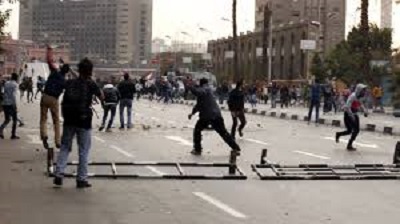EGYPT MILITARY LEADERSHIP MEETS POLITICAL AND RELIGIOUS FIGURES
 Cairo, 24 Sha’ban 1434/3 July 2013 (MINA) – Military figures are currently holding meetings with religious, political and youth figures on Wednesday afternoon (3/7).
Cairo, 24 Sha’ban 1434/3 July 2013 (MINA) – Military figures are currently holding meetings with religious, political and youth figures on Wednesday afternoon (3/7).
In a short announcement, the military confirmed the meeting and stated it will release a statement immediately after the meetings, Daily News Egypt reported as monitored by Mi’raj News Agency (MINA).
Reports surfaced mid-Wednesday of a meeting between opposition leader Mohamed ElBaradei and Defence Minister Abdul Fatah Al-Sisi.
Founding member of Al-Dostour Party Maha Mekkawy confirmed the meeting, saying ElBaradei and three members of Tamarod campaign were invited to the meet with the defence minister. She qualified, however, that she has no further information on the meeting’s subject or contents, and no statements regarding it had yet been released.
On Tuesday, Al-Dostour Party Chairman ElBaradei was nominated by the Tamarod-backed June 30 Front and opposition bloc the National Salvation Front to serve as the representative of the opposition in talks with the government to solve the current situation.
After a long political impasse and escalating tensions, the military announced on Monday that it will implement a roadmap for the country if the presidency and the opposition cannot resolve their differences within 48 hours.
On July, 1st through a presidential spokesman, Ehab Fahmy, Mohamed Morsi called for that dialogue is the only way out of Egypt’s political crisis.
“Dialogue is the only way through which we can reach an understanding. The presidency is open to a real and serious national dialogue,” Fahmy told reporters, Sunday(30/6).
He urged protesters to maintain “the peaceful nature” of their protest, pointing to the anti-Morsi rallies as proof of freedom of expression in Egypt.
In one camp are the president and his Islamist allies, including the Muslim Brotherhood and more Islamist groups. They say street demonstrations cannot be allowed to remove a leader who won a legitimate election, and they accuse Mubarak loyalists of being behind the campaign in a bid to return to power.
They have argued that for the past year remnants of the old regime have been sabotaging Morsi’s attempts to deal with the nation’s woes and bring reforms. On the other side of the spectrum is an array of secular and liberal Egyptians, moderate Muslims, Christians — and what the opposition says is a broad sector of the general public that has turned against the Islamists.
Mohamed Morsi born 8 August 1951) was the fifth President of Egypt, having assumed office on 30 June 2012.
Mohamed Morsi was educated in Egyptian public schools and universities; he was later granted a scholarship from the Egyptian Government to prepare for a PhD degree in the United States. Morsi was a Member of Parliament in the People’s Assembly of Egypt from 2000 to 2005, and a leading member in the Muslim Brotherhood. He became Chairman of the Freedom and Justice Party (FJP) when it was founded by the Muslim Brotherhood in the wake of the 2011 Egyptian revolution. He stood as the FJP’s candidate for the May–June 2012 presidential election.
On 24 June 2012, the election commission announced that Morsi won Egypt’s presidential runoff against Ahmed Shafik, the last prime minister under deposed leader Hosni Mubarak. According to official results, Morsi took 51.7 percent of the vote while Shafik received 48.3 percent. As he had promised during his campaign, Morsi resigned from his position as the head of the FJP after his victory was announced.
On 30 June 2013 mass protests erupted across Egypt calling for the President’s resignation followed by the army’s threat that if the protesters’ demands aren’t met by 3 July it will step in and build a road map for the country while insisting that it did not want to rule the country. Some took this to mean a military coup, but the next day the army denied that they were referring to a possible military coup. The plan set up by the military includes suspending the constitution, dissolving the parliament and establishing a new administration headed by the chief justice. (T/P03/P04)
Mi’raj News Agency (MINA)





